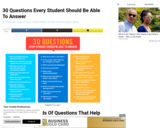
This article highlights questions every teacher should be thinking about when planning for their students.
- Subject:
- Education
- Material Type:
- Activity/Lab
- Teaching/Learning Strategy
- Author:
- Teach Thought
- Date Added:
- 08/12/2020

This article highlights questions every teacher should be thinking about when planning for their students.

This site offers a wide variety of activities, games, and strategies that make teaching division more effective … and more fun.

Give kids a paintbrush and a box of watercolors, and they can stay busy for hours all on their own. But, did you know there are plenty of other ways to get creative with paint? You can paint with bubbles, use salt for texture, or even build a paint pendulum. They’re all here in this roundup of incredible painting ideas for kids!

Author: Lee Watanabe-Crockett
This is a phenomenal gathering of web sites that include resources to teach:
Digital footprints
Citing Sources
Detecting Plagarism
Personal Responsibility
Global & Cultural Awareness
Safe Web Searching

October is Women’s History Month in Canada, a time to celebrate the women and girls from our past, and our present, who are contributing to a better, more inclusive Canada.
In 1992, the Government of Canada designated October as Women’s History Month, marking the beginning of an annual celebration of the outstanding achievements of women and girls throughout Canada’s history. This year marks the 30th anniversary of Women’s History Month.
This year’s theme, She Did, So Now I Can, celebrates the actions of inspiring Canadian women that positively impact our lives today, right now, at this very minute. We are thankful for their courage and for inspiring us to do better.
The menu for this site includes links to explore:
- Women in Canadian History: A Timeline
- Women of Impact
- Women's History Month 2022
- International Day of the Girl Child - October 11
- Persons Day - October 18

A great list of books to read aloud to students in the first days of school.
Also consider:
Maybe - by Kombi Yamada - a book about the endless possibilities in all of us.
What Do You Do With A Problem - by Kombi Yamada - a great book to introduce and discuss the struggles you may face together as a class.
Add your favourites in the comments section below!

Bring the vocabulary of film to life through the processes of filmmaking. Students learn terminology and techniques simultaneously as they plan, film, and edit a short video.

An interactive applet and associated web page that demonstrate the properties of a 3:4:5 triangle - one of the Pythagorean triples. The applet shows a right triangle that can be resized by dragging any vertex. As it is dragged, the remaining vertices change so that the triangle's side remain in the ration 3:4:5. The text on the page has an example of how the triangle can be used to measure a right angle on even large objects. Applet can be enlarged to full screen size for use with a classroom projector. This resource is a component of the Math Open Reference Interactive Geometry textbook project at http://www.mathopenref.com.

Summer is all about fun, but that doesn’t mean you have to stop learning. You can combine fun and education when you use these fun, engaging summer learning activities! These fun summer learning activities are perfect for toddler, preschool, pre-k, kindergarten, first grade, 2nd grade, and 3rd graders for July and August! Whether it’s outside fun or summer worksheets – you will love these summer learning activities for kids.
Please note: there are more than 34 activities listed here! Lots of fun for the entire summer!

The students were given one period each week for 5 weeks to explore their interests and plan, implement and produce a Genius Hour Presentation in a format of their choosing. They began with a few worksheets to identify their interest areas and various ideas in which they may present their information and also various formats both electronically and paper-based which they could use to showcase their learning. The students used books, ipads and computers to access information. Various showcases included working replicas of battery-operated cars and helicopters, working volcanoes, a hockey rink, baking, painting and posters. Students were so engaged that most students completed the majority of their projects outside of school on their own time.

TWENTY amazing lessons to teach computer science to Grades 3 to 5.
The curriculum is organized into 5 units: Scratch Review, Creative Commons, Makey Makey, Conditionals and Final Project.
If you need something easier be sure to use the Green level (Level 1) by using the tabs at the top of the website or finding it in the resource bank. If you need something harder head to Purple (Level 3) using the same method.
This fabulous resource has everything you need to get started coding and computer science with your students TODAY!

TWENTY amazing lessons to teach computer science to Grades 3 to 5.
The curriculum is organized into 5 units: Scratch review, variables, Makey Makey, advanced games and final project.
If you need something easier be sure to use the Green level (Level 1) or Blue level (Level 2) by using the tabs at the top of the website or finding it in the resource bank.
This fabulous resource has everything you need to get started coding and computer science with your students TODAY!

For students, summer is a fantastic time to relax and rejuvenate from the previous school year. Students can make the most of the summer and time in the sun by participating and engaging in fun activities, whether they take place inside or outside, alone or with a group of friends.
Check out this site to find fun and educational summer activities that middle schoolers will enjoy! Some examples are: Geocaching, DIY Solar Oven, Pool Noodle Olympics, DIY Lava Lamp, DIY Terrarium, Board Game Championship, Obstacle Course for Kids, Free Online Classes, and more!

Quand on doit garder les enfants dans la maison sur une longue période, on peut ne plus savoir comment les amuser, ni comment faire en sorte qu’ils s’amusent de façon plus ou moins autonome afin que les parents puissent remplir leurs obligations ménagères ou en télétravail.

This site offers a wide selection of 360 videos from around the world. Choose from a world map or do a search to explore what there is to offer!

"The 365 Black Canadian Curriculum is an online project by the Elementary Teachers’ Federation of Ontario (ETFO), and is designed for primary, junior and intermediate educators to teach about the lived experiences of black Canadians from the past and present, 365 days a year. Students have an opportunity to learn about black Canadian scientists, medical professionals and inventors, black Canadian community leaders and political leaders. The curriculum includes a calendar; primary, junior and intermediate lesson plans in English and French; a workshop for staff; and a poster for educators."

What do gray wolves, elephants, and parrotfish have in common? They're all keystone species, which means they have an especially large impact on their habitat. SciShow explores how these animals keep their ecosystems running.

Three lessons from the NFB for Pink Shirt Day.
1. Bully Dance - This film "...can be a starting point for discussions about peer pressure, respect, sharing and cooperation, and empathy. For older students, the conversation can move towards how groups can influence/negate a bully culture and how bystanders can unknowingly reinforce bully behaviours."
2. Door to Door - This film "...encourag{es] positive, open dialogue between two grade levels...highlighting the proactive results of conflict resolution."
3. Glasses - "This film highlights ideas related to peer pressure, inclusivity and friendship." *Warning - mention of self-harm.

These three lessons from NFB can be used for Pink Shirt Day.
1. Bully Dance - shows how a community can deal with a bully. There are two teacher guides in CAMPUS (remember as a teacher in SK you have full access to CAMPUS for free!)
2. Discrimination: Tales of Ordinary Fatphobia - the story of a young girl who faces bullying because of her body. There is a viewing guide and a lesson plan to go with this film.
3. Cyberbullying - Star Wars Kid: The Rise of the Digital Shadows - this story deals with cyberbullying and the impacts it can have. This connects media studies and bullying. A lesson is provided.

Today we’re going to discuss how 3D graphics are created and then rendered for a 2D screen. From polygon count and meshes, to lighting and texturing, there are a lot of considerations in building the 3D objects we see in our movies and video games, but then displaying these 3D objects of a 2D surface adds an additional number of challenges. So we’ll talk about some of the reasons you see occasional glitches in your video games as well as the reason a dedicated graphics processing unit, or GPU, was needed to meet the increasing demand for more and more complex graphics.